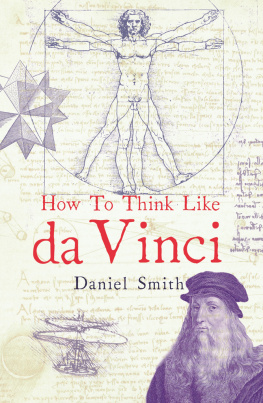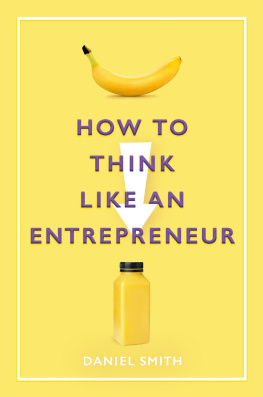Contents
100 THINGS YOU WILL NEVER DO
AND HOW TO ACHIEVE THE IMPOSSIBLE
DANIEL SMITH
First published in 2013 by
Quercus Editions Ltd
55 Baker Street
7th floor, South Block
London
W1U 8EW
Copyright 2013 Quercus Editions Ltd
All rights reserved. No part of this publication may be reproduced, stored in a retrieval system, or transmitted in any form or by any means, electronic, mechanical, photocopying, recording, or otherwise, without the prior permission in writing of the copyright owner and publisher.
The picture credits constitute an extension to this copyright notice.
Every effort has been made to contact copyright holders. However, the publishers will be glad to rectify in future editions any inadvertent omissions brought to their attention.
Quercus Editions Ltd hereby exclude all liability to the extent permitted by law for any errors or omissions in this book and for any loss, damage or expense (whether direct or indirect) suffered by a third party relying on any information contained in this book.
A catalogue record of this book is available from the British Library
eBook ISBN 978 1 78206 7 245
UK and associated territories:
Print ISBN 978 1 78206 455 8
You can find this and many other great books at:
www.quercusbooks.co.uk
//// CAUTION ////
The information in this book is designed to entertain only and is not intended as a practical guide for undertaking the pursuits described. Many of the activities presented are highly dangerous and involve serious risk of injury or death; they should not be attempted under any circumstances. Nothing in this book should be construed as advice or recommendation to undertake any of the activities. The author and publishers expressly disclaim any responsibility for any adverse effects arising from the use or application of the information contained herein.
Introduction
Impossible is a word to be found only in the dictionary of fools, said Napoleon Bonaparte, a man not known for putting constraints upon himself. Of course, his plans for world domination did not end quite as he might have hoped, but there can be no knocking his ambition. The casual reader about to embark on a journey through this book could do much worse than familiarize themselves with the Little Generals bon mots above the refusal to accept failure, the desire to push oneself to the limit, the enthusiastic embracing of a life without boundaries. So steady your nerve, don the bicorne hat of destiny and prepare to take on challenges you never thought possible.
Over the pages that follow are a hundred activities that the average man or woman in the street is unlikely to ever attempt unlikely, in some cases, to ever even want to attempt. Nonetheless, a good many of them are more achievable than you might imagine, given the odd compromise and bit of lateral thinking. Some probe at the very boundaries of science, while others will appeal to thrill-seekers, people who wish to examine their personal limits and those who are simply in search of new experiences.
But first, a word of warning. Several entries, you will soon realize, are here for pure reading entertainment and shouldnt be considered as a challenge to take up in the real world. A few are so utterly reckless that no one in their right mind would want to try them anyway. For instance, while Russian roulette might make for a dramatic scene in The Deer Hunter, in real life it is a game for the terminally stupid. Nor is it being suggested that you might like to try to steal the Mona Lisa and hopefully you will never be in the position where you need to escape from Alcatraz. Similarly, only a fool would consider wrestling an alligator anywhere but in the relative safety of their imagination.
However, what these hundred entries illustrate is that very little in this world is utterly un-doable.
Whether it is a case of nudging against the basic laws of science and nature or merely stepping beyond our personal limits, even that which we consider impossible may be reassigned as eminently achievable (even if simultaneously retaining the labels of distinctly improbable and highly inadvisable too).
Most of these activities are not the sort of thing you can undertake on a whim in the morning and master by sunset. Each requires a dedication to the cause, a steely focus and in most cases a determination to learn skills you probably never knew you had. But as the writer and philosopher George Santayana once noted: The Difficult is that which can be done immediately; the Impossible that which takes a little longer.
What this book is not is any kind of comprehensive instructional guide to tell you everything you need to know to complete each challenge. If you plan to undertake any of them, it is essential that you seek out expert advice and guidance on how to prepare for and achieve them. Make yourself aware of any risks and be sure to keep within the law! In certain cases, you may also want to double-check that your life insurance premiums are up to date.
Those who feel they lack the necessary vim and vigour to take up the gauntlet should remember the words of Helen Keller: Optimism is the faith that leads to achievement. Nothing can be done without hope and confidence.
Few people who have ever lived could rival Kellers track record of achieving that which had seemed all but impossible. Born in 1880, she was not yet two years old when she contracted an illness (perhaps meningitis or scarlet fever) that left her blind and deaf and, apparently, without the vital tools to communicate with the world. However, thanks in no small part to the tireless efforts of her companion and teacher Anne Sullivan, Keller not only learned to communicate, but became one of the most notable campaigning figures of her age. In 1904 she became the first deaf-blind person to receive a Bachelor of Arts degree, when she graduated from Radcliffe College in Cambridge, Massachusetts. She went on to serve as a fearless spokeswoman for, among others, the disabled, workers, pacifists, suffragists and the family planning movement. She also published twelve books in her lifetime, befriending writers, celebrities, industrialists and presidents along the way for good measure. So it seems fitting to leave the final word to Keller, a woman who overcame enormous challenges to achieve extraordinary things: Life is either a daring adventure or nothing at all.

Score in a World Cup final
WHAT IT IS Hitting the back of the net on the biggest stage imaginable
WHY YOU WONT DO IT In a match played once every four years and averaging 1.5 goals per game since 1990, few ever get the chance
Today, soccer is the global game, and it offers no greater glory than scoring a goal in the World Cup final. If you hit the net in the biggest game of them all, youll never have to buy a drink again. So lace up those golden boots, and prepare for immortality.
Your first step is to become good enough so that your national coach plays you and while not all World Cup goalscorers play as strikers, this position traditionally offers the most opportunity for glory.

















